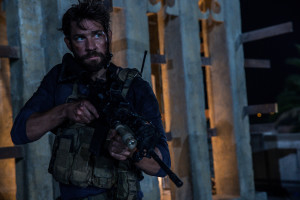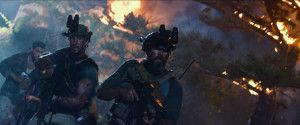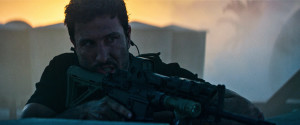Michael Bay was born to bring us 13 Hours: The Secret Soldiers of Benghazi. Yeah, believe it. The filmmaker known for his explosive cinematic scope that has raked in billions of dollars with films such as The Rock through all the Transformers movies, has always had an affinity for portraying the U.S. military in the brightest of lights and that fact has never been truer than with his latest film.
13 Hours: The Secret Soldiers of Benghazi tells the tale of what happened in that notorious Libyan city. Specifically, it focuses on the six military contractors that were hired to protect a secret CIA base in the lawless locale. They would get dragged into the tragic September 11, 2012 attack on a U.S. diplomatic outpost that would claim the life of U.S. Ambassador to Libya Chris Stephens and several others.
Of course, we’ve all heard about this true story. It started out is a series of news reports that were misinformed. Radicals were taking their revenge on the nearest Americans due to a film that was perceived to be slanderous to Islam. Secretary of State Hillary Clinton was raked over the coals for her involvement in, or perceived lack of, the protection of American lives that were in harm’s way. Several House Republican special committees and investigations found nothing that Clinton had done wrong, but conservatives love to bring up Benghazi whenever her presidential campaign seems to gain steam.
Would Bay and screenwriter Chuck Hogan take a stand? Would they make a movie with political overtones, simply tell the story of the six men who bravely entered a battle that they were not hired to join or would there be a mixture of political realism meets military response? Thankfully, and surprisingly, they kept to the tone and feel of the book that the film is based on by Mitchell Zuckoff.
13 Hours is a surprisingly apolitical look at what happened and does so in the most incredible, emotionally moving and thrilling ways. Bay draws us in to the story by following the arrival of Jack Silva (John Krasinski) in country. His eyes are our eyes to the post-revolution Libya and how unstable it is, especially considering it is a landscape that America’s leaders had hoped would find democracy spreading like wildfire after decades of menacing rule by Gaddafi. Warring factions are at each other’s throats and more importantly, if there’s something they can agree on, it is that Americans are less than welcomed in their country.
We see that immediately in Silva’s ride from the airport to his post where he is reporting for duty as a military security contractor to help protect a CIA outpost that is “not really there.” A traffic jam proves extremely life threatening and the breadth of the potential violence is made clear by Bay. What compounds the danger is that the “good guys” and the “bad guys” look the same – something American forces have had issues with since Korea.
When Bay puts us in that world, differentiating who is with us and who is against us is a lesson in complete and utter terror.
The viewer can sense the rising temperature, both literally in the air of the desert locale and in the evil forces that seem to be enclosing on the Americans. The Ambassador (Matt Letscher) is coming to Benghazi as he truly believes in the spreading democracy potential of a new and improved Libya.
In the film, it is portrayed that he knows that the former mansion that he will call a diplomatic outpost and home for several days is not up to American standards of security. When our military contractors do the State Department a favor and check out the facility, they reiterate that fact. Does the Ambassador take any further precautions? In Bay’s film, he is portrayed as someone who believes in the cause, and then pays the ultimate price for his faith in democracy.
Our six heroes, even with the CIA leader’s stern objections, race to try to help when the compound comes under attack, but it’s too late. Once the ambassador’s temporary abode is overrun, our military experts know all too well, the CIA stronghold nearby is next. They race back and a majority of our film’s heart-pounding thrills commence.
Bay’s cast is astounding. Krasinski is a fine actor who many might think only as Jim from The Office. He digs deep and turns in a performance that truly honors the real life hero he portrays. Another standout is James Badge Dale (you might remember him from The Lone Ranger). Throughout, the men who play the six are top notch and Bay does some of his best work balancing action and emotion, thus having his audience truly engaged in these characters and the risk that each is taking by continuing to fight for their life.
The cinematography is typically Bay. There’s slow motion. There’s dust flying from the dry earth. Bullets ring through the night and day as if each has a life of its own. There is hardly a dull moment and never a line delivered that warrants an eye roll, as many of Bay’s film is guilty of having.
Considering the heroic nature of what the entire team does during the elongated attack on the compound, in hindsight, there was no room for political overture in Bay’s film. The audience can draw their own conclusions, but if this writer’s years of political science studies have taught him anything, it is that when working for the CIA, you are on your own. Phone calls don’t get answered. Help is not coming. There is no blame to pass around. That is inherent in the job. Your role as a member of a CIA-hired armed forces group is to get Americans out safely and to save yourself if possible. At one point in the film, they request an American F-16 at least do a fly over to scare away the militants. The response is crickets. It is not as if they were being ignored. That is simply the nature of the beast. This is the C.I.A. we’re talking about. These people were all alone and thank goodness they had those six Secret Soldiers of Benghazi.
Grade: B+




